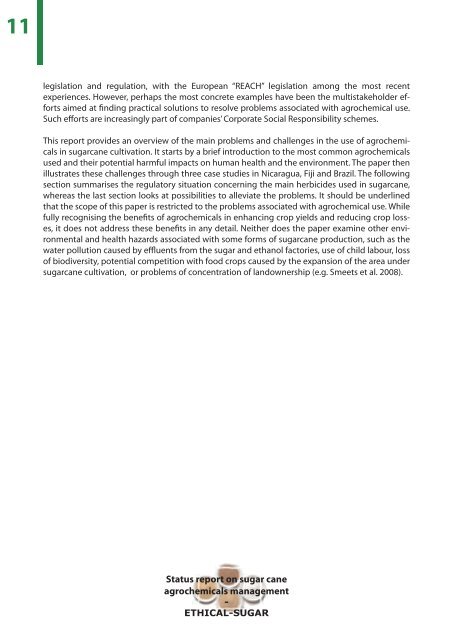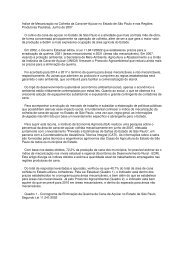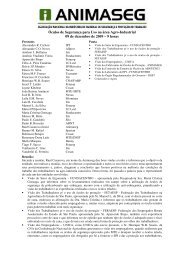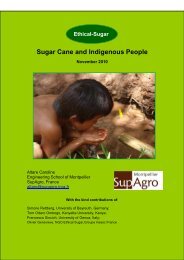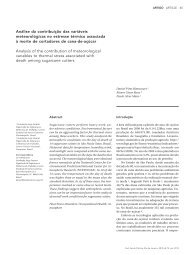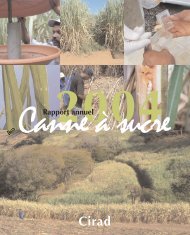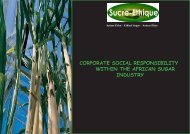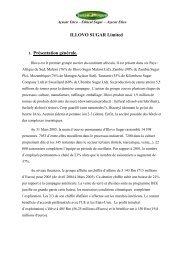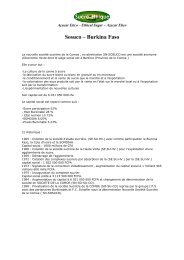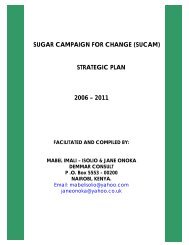Status report on sugar cane agrochemicals ... - Sucre Ethique
Status report on sugar cane agrochemicals ... - Sucre Ethique
Status report on sugar cane agrochemicals ... - Sucre Ethique
You also want an ePaper? Increase the reach of your titles
YUMPU automatically turns print PDFs into web optimized ePapers that Google loves.
11<br />
legislati<strong>on</strong> and regulati<strong>on</strong>, with the European “REACH” legislati<strong>on</strong> am<strong>on</strong>g the most recent<br />
experiences. However, perhaps the most c<strong>on</strong>crete examples have been the multistakeholder efforts<br />
aimed at � nding practical soluti<strong>on</strong>s to resolve problems associated with agrochemical use.<br />
Such e� orts are increasingly part of companies’ Corporate Social Resp<strong>on</strong>sibility schemes.<br />
This <str<strong>on</strong>g>report</str<strong>on</strong>g> provides an overview of the main problems and challenges in the use of <strong>agrochemicals</strong><br />
in <strong>sugar</strong><strong>cane</strong> cultivati<strong>on</strong>. It starts by a brief introducti<strong>on</strong> to the most comm<strong>on</strong> <strong>agrochemicals</strong><br />
used and their potential harmful impacts <strong>on</strong> human health and the envir<strong>on</strong>ment. The paper then<br />
illustrates these challenges through three case studies in Nicaragua, Fiji and Brazil. The following<br />
secti<strong>on</strong> summarises the regulatory situati<strong>on</strong> c<strong>on</strong>cerning the main herbicides used in <strong>sugar</strong><strong>cane</strong>,<br />
whereas the last secti<strong>on</strong> looks at possibilities to alleviate the problems. It should be underlined<br />
that the scope of this paper is restricted to the problems associated with agrochemical use. While<br />
fully recognising the bene� ts of <strong>agrochemicals</strong> in enhancing crop yields and reducing crop losses,<br />
it does not address these bene� ts in any detail. Neither does the paper examine other envir<strong>on</strong>mental<br />
and health hazards associated with some forms of <strong>sugar</strong><strong>cane</strong> producti<strong>on</strong>, such as the<br />
water polluti<strong>on</strong> caused by e� uents from the <strong>sugar</strong> and ethanol factories, use of child labour, loss<br />
of biodiversity, potential competiti<strong>on</strong> with food crops caused by the expansi<strong>on</strong> of the area under<br />
<strong>sugar</strong><strong>cane</strong> cultivati<strong>on</strong>, or problems of c<strong>on</strong>centrati<strong>on</strong> of landownership (e.g. Smeets et al. 2008).<br />
<str<strong>on</strong>g>Status</str<strong>on</strong>g> <str<strong>on</strong>g>report</str<strong>on</strong>g> <strong>on</strong> <strong>sugar</strong> <strong>cane</strong><br />
<strong>agrochemicals</strong> management<br />
-<br />
ETHICAL-SUGAR


